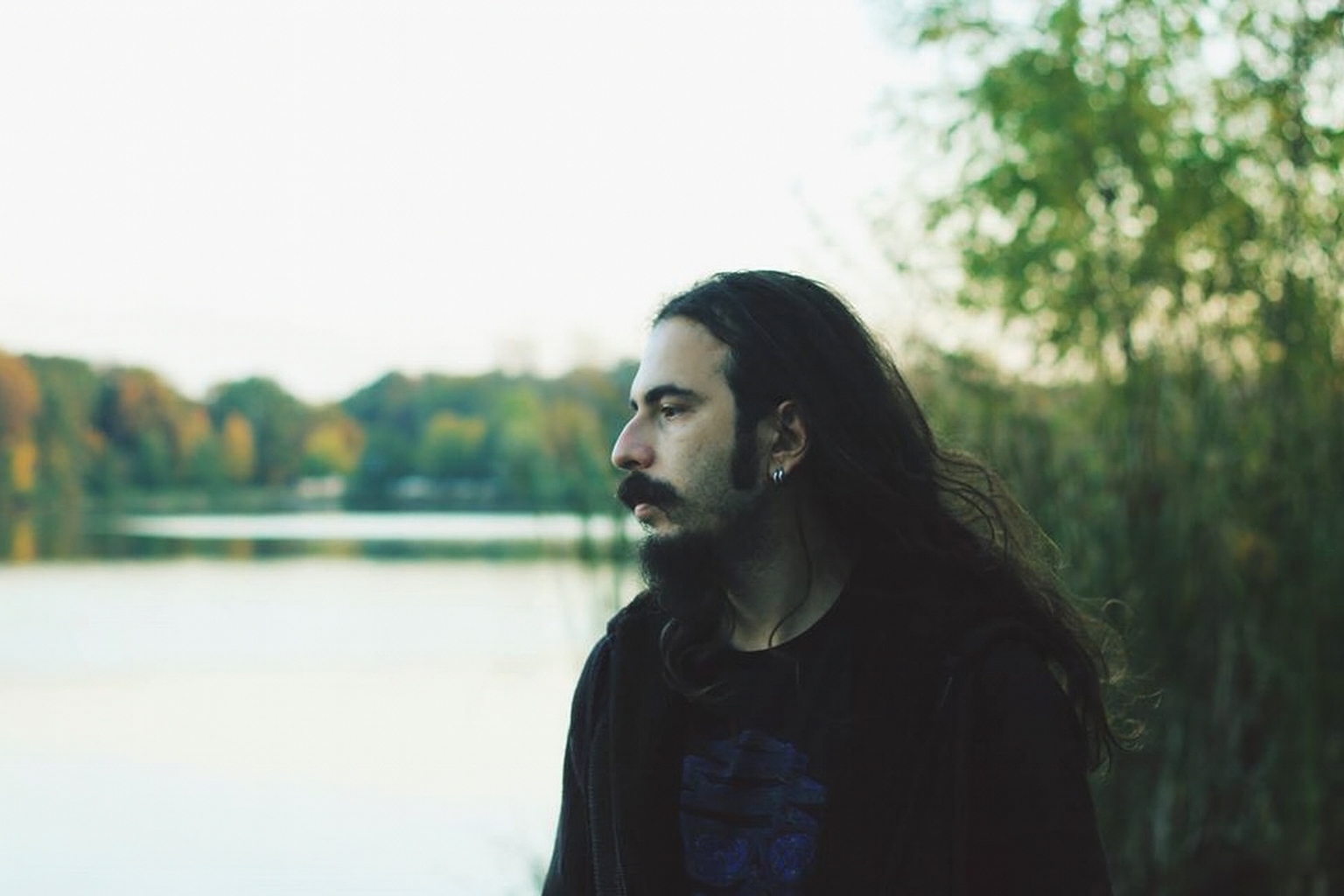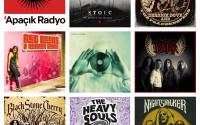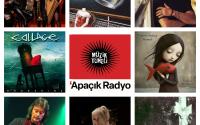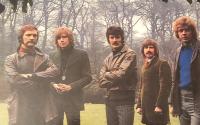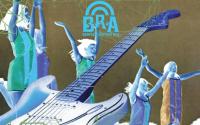Zifir'de Uğur Çıkrıkçılı, TİR projesi ile Dungeon Synth alanında bilinen, karanlık zindanlardan yaydığı sesi çeşitli ülkelerde festival ve konserlerde dinleyiciye ulaşan Oytun Bektaş ile Prophecy Fest vesilesiyle bir araya geliyor.
Prophecy Fest vesilesiyle yapmış olduğumuz röportajlara, TİR projesi ile Dungeon Synth alanında bilinen, karanlık zindanlardan yaydığı sesi çeşitli ülkelerde festival ve konserlerde dinleyiciye ulaşan Oytun Bektaş ile devam ediyoruz. İstanbul’da müzik hayatına başlayan ve şu an Sydney‘de çalışmalarına devam eden müzisyen ile tarihi Balve Mağarası’nda keyifli bir söyleşi gerçekleştirdik.
Zifiri okumalar
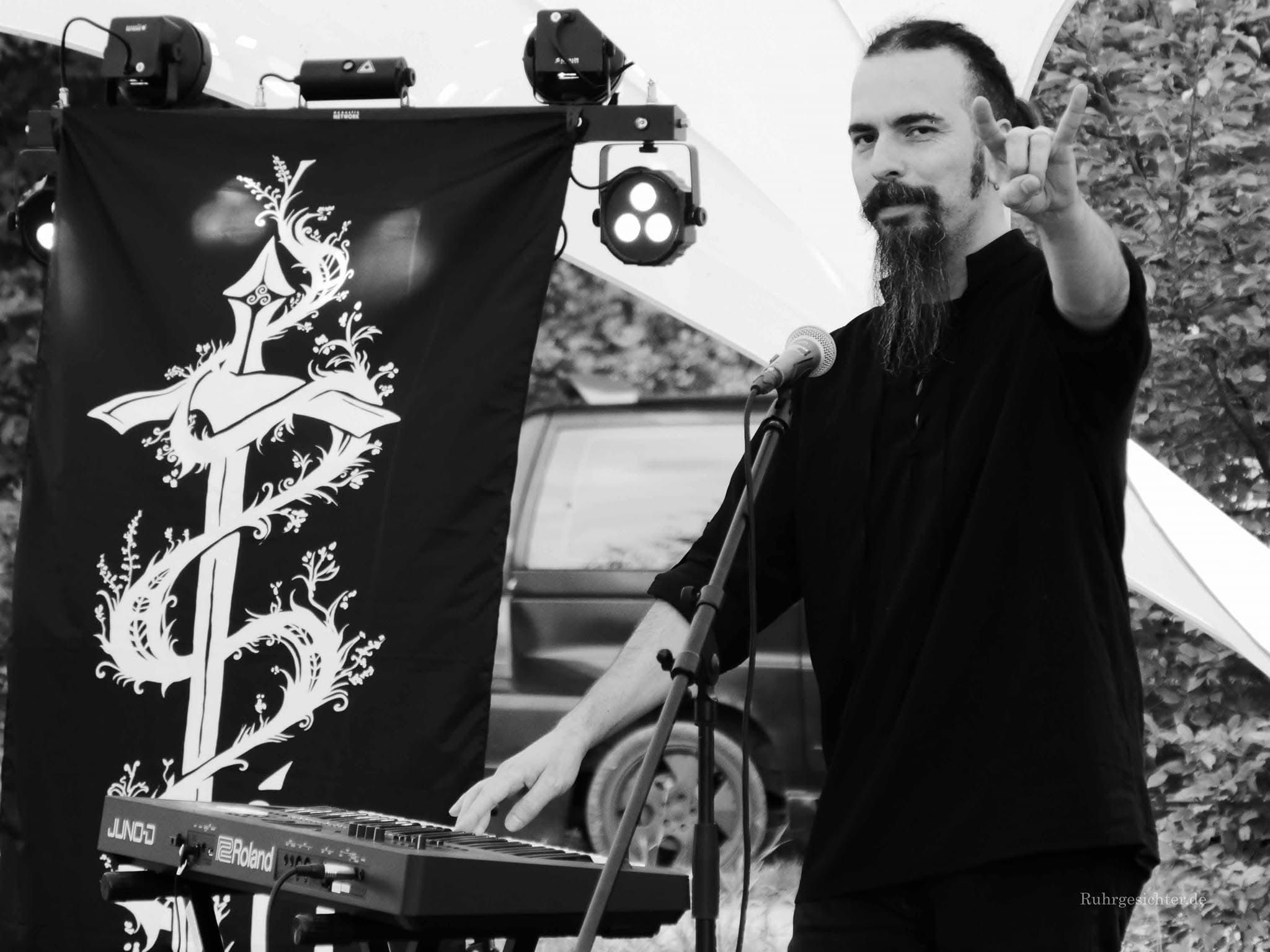
Uğur Çıkrıkçılı: Dungeon Synth dinlerken zaman yavaşlıyor ya da farklı bir akışa giriyor hissi oluşuyor bende. Bir de karanlık ve kasvet dahil olduğunda dinleyicinin deneyimi çok farklı bir boyut alıyor. Sen TİR’in müziğini yaparken zaman, 'karanlık ve sessizlik’ temalarını nasıl kullanıyorsun?
Oytun Bektaş: Belirli bir ölçüt üzerinden bestelemiyorum aslında. Melodiler birbirine dolaşırken, kullandığım enstrümanlar da başta birbirinden bağımsız kanallara dağılır. Ne zaman ki sonuçlardan ve yarattığım temadan tatmin oluyorum, o zaman o dağınık parçaları tek bir plana oturtuyorum. Teknik gibi görünse de, asıl amaç atmosferi ve duyguyu netleştirmek. Karanlık ya da melankoli, en küçük ayrıntıdan en bütüncül noktaya kadar bu süreçte vücut buluyor.
U.Ç.:Awaiting the Dawn albümünde eski metinlere, şiirlere ve mitlere dokunuyorsun. Sana göre edebiyat ve şiir yaratıcılığında ne ölçüde katalizör görevi görüyor?
O.B.: İyi bir okurum. Politik felsefe ve psikoloji her zaman öncelikli alanlarım oldu. Belki TİR’in temasıyla doğrudan alakalı görünmüyor ama beni ben yapan, doğayı ve türleri anlamama yol açan kökler bunlar. O yüzden müziğimde dolaylı da olsa izlerini bulmak mümkün.
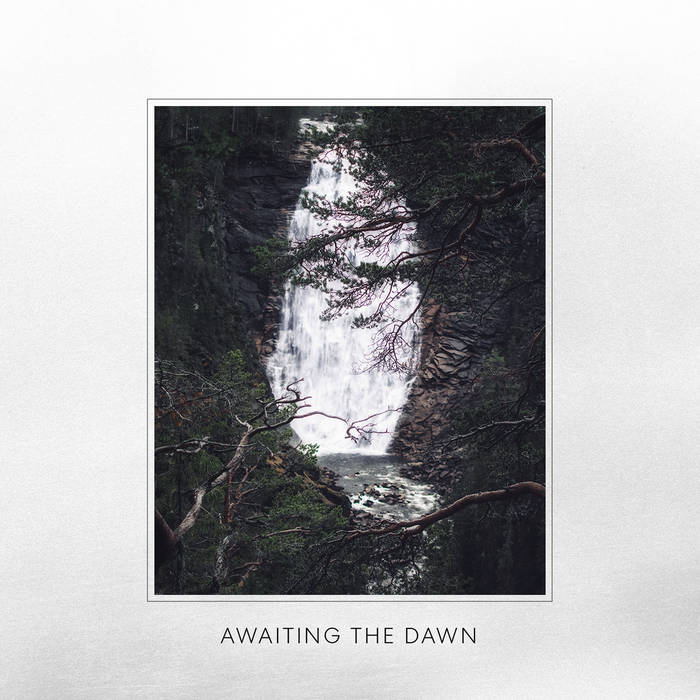
U.Ç.: Albüm kapakları ve görseller Dungeon Synth’de çok tipiktir ve çok sevsem de bazen grupların tekrarlara ve kopyalamalara düştüğünü düşünürüm. Albüm kapakları ve tasarımların konusunda neler söylersin?
O.B.: Son dönemde özellikle Dungeon Synth dışındaki sahnelerde bile AI ile yapılmış kapaklar görüyoruz ama sanat bence emek ve yaratıcılığın fiziksel yansıması. Yüzyıllar öncesinden bugüne kadar sayısız resim, illüstrasyon ve fotoğraf bize yol gösterdi, karanlık sanata yön verdi. O yüzden AI ile kapak ya da logo üretmek bana göre değil. Dünyanın sokakları, ormanları zaten çekilmeyi bekleyen karelerle dolu. Gerçek bir sanatçı, en azından oradan ilham alarak çok daha değerli bir kapak yaratabilir.
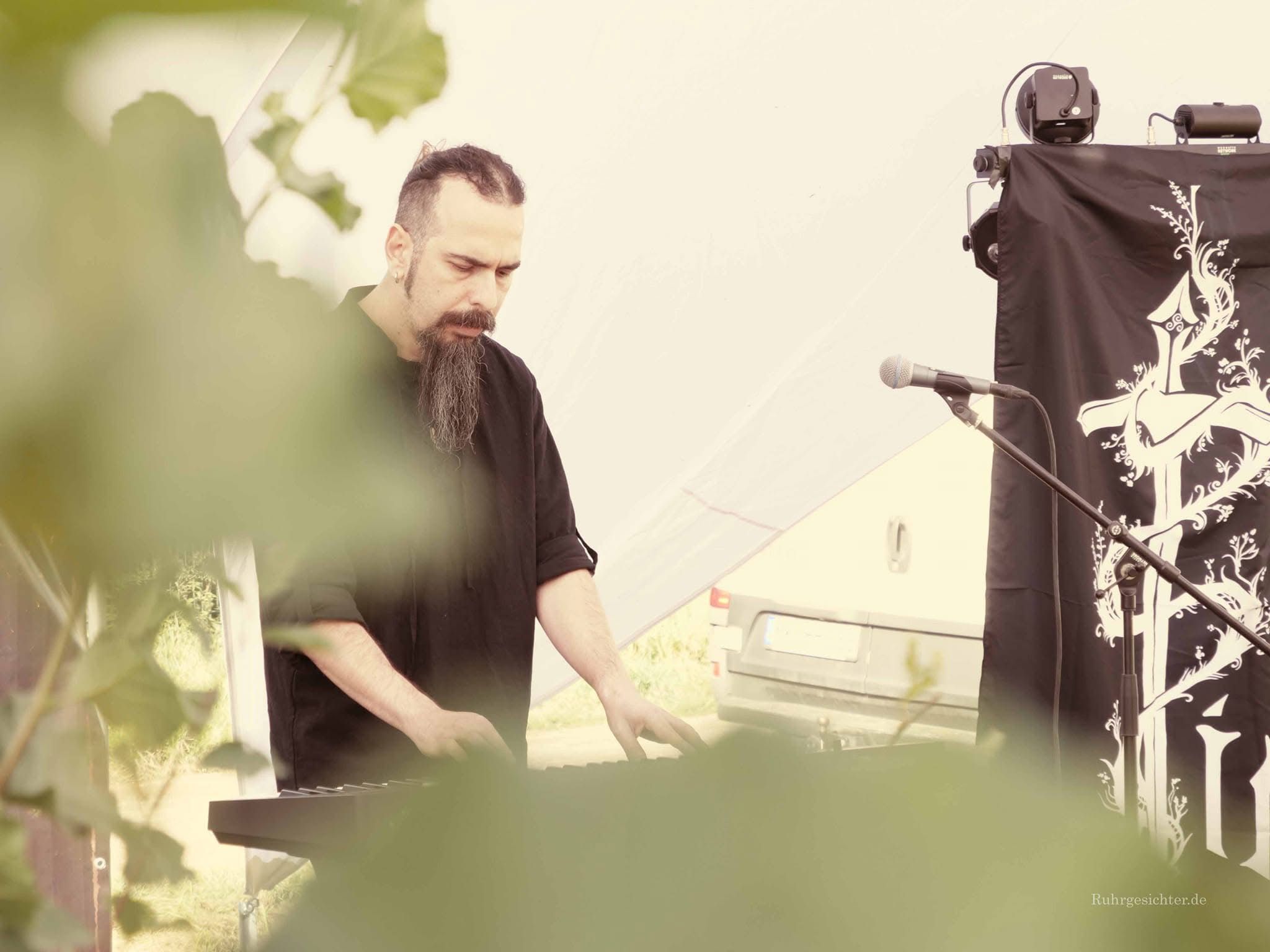
U.Ç.: Şu an Prophecy Fest’deyiz ve bence Avrupa için önemli orta ölçekli bir festival burası. Bilindik gruplar ile fazla parlamadan, çok fazla bilinmedik gruplara yer verip underground festival statüsünde de durmayan önemli bir festival bence. Bu sahnede, daha doğrusu Mağara’da olmak nasıl bir deneyim?
O.B.: Prophecy Festivali'ni başlangıç gününden beri her zaman özel bir yere konumlandırdım ve benim için özel bir yanı var. Buradaki önemli olan detay, Label’in sahibi Martin ile 2016’ya uzanan dostluğumuz ve sahne alan çoğu Prophecy etiket band’i ile yakın ilişkilere sahip olmam da diyebilirim ama her şeyden öte, festivalin Dortmund’a uzak bir kasaba da konumlanışı, kamp ve doğa ile doğru vakit geçirmek için ideal bir yer oluşu ve de mağaranın estetiği beni dinleyici olarak katıldığımda her zaman heyecanlandırmıştır ve şu an çok başka bir duygu durumundayım. Bu atmosferi şimdi bir sanatçı olarak taşıyorum ve bu tarifsiz bir duygu. Benim için şüphesiz hem sahne açısından, hem de sonrası için her şey çok olumlu geçti Bu yüzden orada bulunan herkese tekrar teşekkür etmek isterim.
U.Ç.: Diskografinde Zerdüşt, Pers kültürü gibi temalar öne çıkıyor ve tarihe yaslanan bir anlatı bu tarzda gördüğümüz bir format. Bu göndermelerin temelinde neler var?
O.B.: Persepolis benim için bir rüyaydı. İran sokaklarından o bölgeye kadar uzanan uzun bir yolculuk sonrası, o yapılara dokunduğumda içimde büyüttüğüm bir albüm fikriydi. Aslında konsept Ruins of Xibalba için düşünülmüştü çünkü orada tarihsel albümler ürettim ama Persepolis’in o mistik ve ürkütücü atmosferi beni öyle sarstı ki sonunda TİR’de hayat buldu. Çölün ortasında ayakta kalan o şeytani hissiyat, esen rüzgârlar… Hepsi şarkılarda birer birer karanlığa dönüştü.
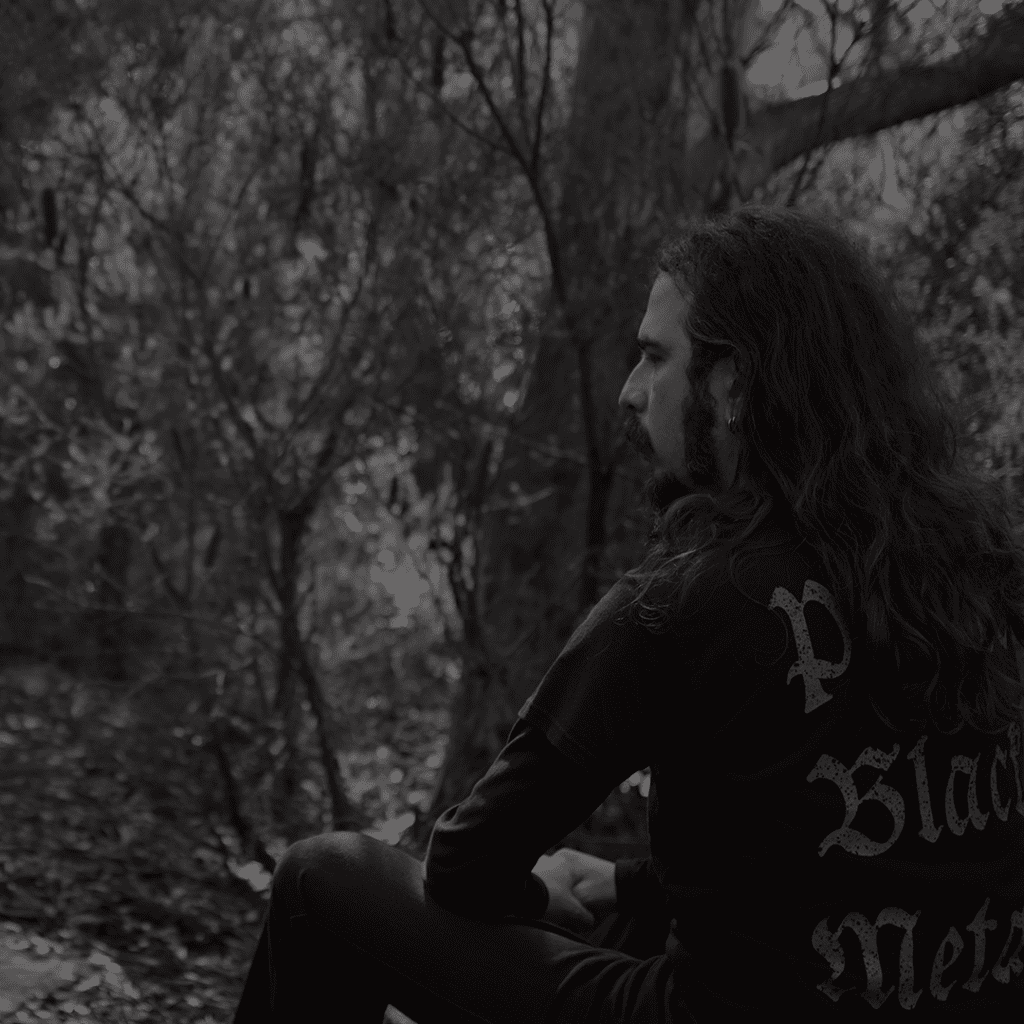
U.Ç.: Bu tarz, bir coğrafyaya sığdırılacak bir şey değil ama şu da bir gerçek ki bu topraklar müzisyeni çok fazla şekilde besleyebilecek acı, tatlı, kanlı, hüzünlü, mitolojik birçok temaya ev sahipliği yapıyor. Sydney’de yaşarken buralara sızmayı, ilham almayı, içsel olarak deneyimleyebiliyor musun?
O.B.: İlk zamanlar, İstanbul’dayken evet çünkü o havayı solurken kayıtsız kalmak mümkün değil ama şu an çok daha farklı. Müzikal temalarım hala varlığını koruyor ama yaşamadığım bir coğrafyaya ait duyguları taklit etmeyi tercih etmiyorum.
U.Ç.: Senin için 'tek kişilik proje' olmanın avantajı ve zorluğu nedir?
O.B.: Şarkıları bestelerken ve kaydederken tartışmayı tek başıma yürütmek bana büyük özgürlük veriyor. Bu yüzden TİR üzerinde kontrolü elimde tutmak iyi hissettiriyor. Sanat anlayışım da zaten hep kendi başıma üretmek üzerine kurulu.
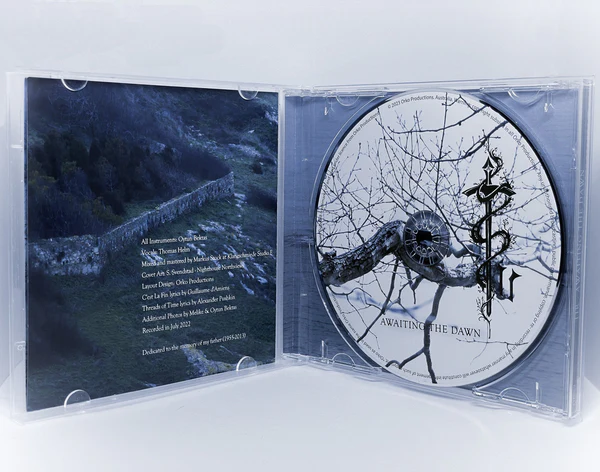
U.Ç.: Yayınlarını bazen kaset, CD gibi formatlarla da paylaşıyorsun. Dijital çağda bu fiziksel formatlar senin için neden hâlâ değerli? Buna değer olduğunu düşünüyoruz ikimizde ama nerede daha kıymetli hale geliyor? Hiçbir şey yapmasan en azından bir prodüksiyon yapacak bir bütçe ayırıyorsun.
O.B.: Son albüm plak olarak da çıktı. Fiziksel bir ürünün dinleyicide bıraktığı etki bence çok kıymetli. Kapak, lirikler, görseller… Hepsi müziği tamamlayan unsurlar. Dijital dünya ters yönde ilerlese de asıl bağı kuran şey bu fiziksel temas. Ayrıca kalıcılık açısından da çok önemli, dijital gibi kaybolup gitmiyor.
U.Ç.: Empyrium ile yakın ilişkilerin ve ortak projelerin var. Türkiye’de bir konser organizasyonu da planlanıyordu ve iptal oldu. Daha önce iki kez gelen bir grup ve bu ülkede dinleyicisi de hatırı sayılır miktarda var. Ne idi sorun?
O.B.: Aslında iptal olmadı, 2026’ya ertelendi. Ama ben TİR olarak o etkinlikte yer almayacağım. Detaya girmeden söyleyebilirim ki süreç tamamen organizasyonun ve promoter’ın beceriksizliğinden kaynaklandı. Resmî olarak güvenlik gerekçesi diye İran-İsrail gerilimi ve Türkiye’deki siyasi durum gösterildi ama bana göre tamamen saçmalık.
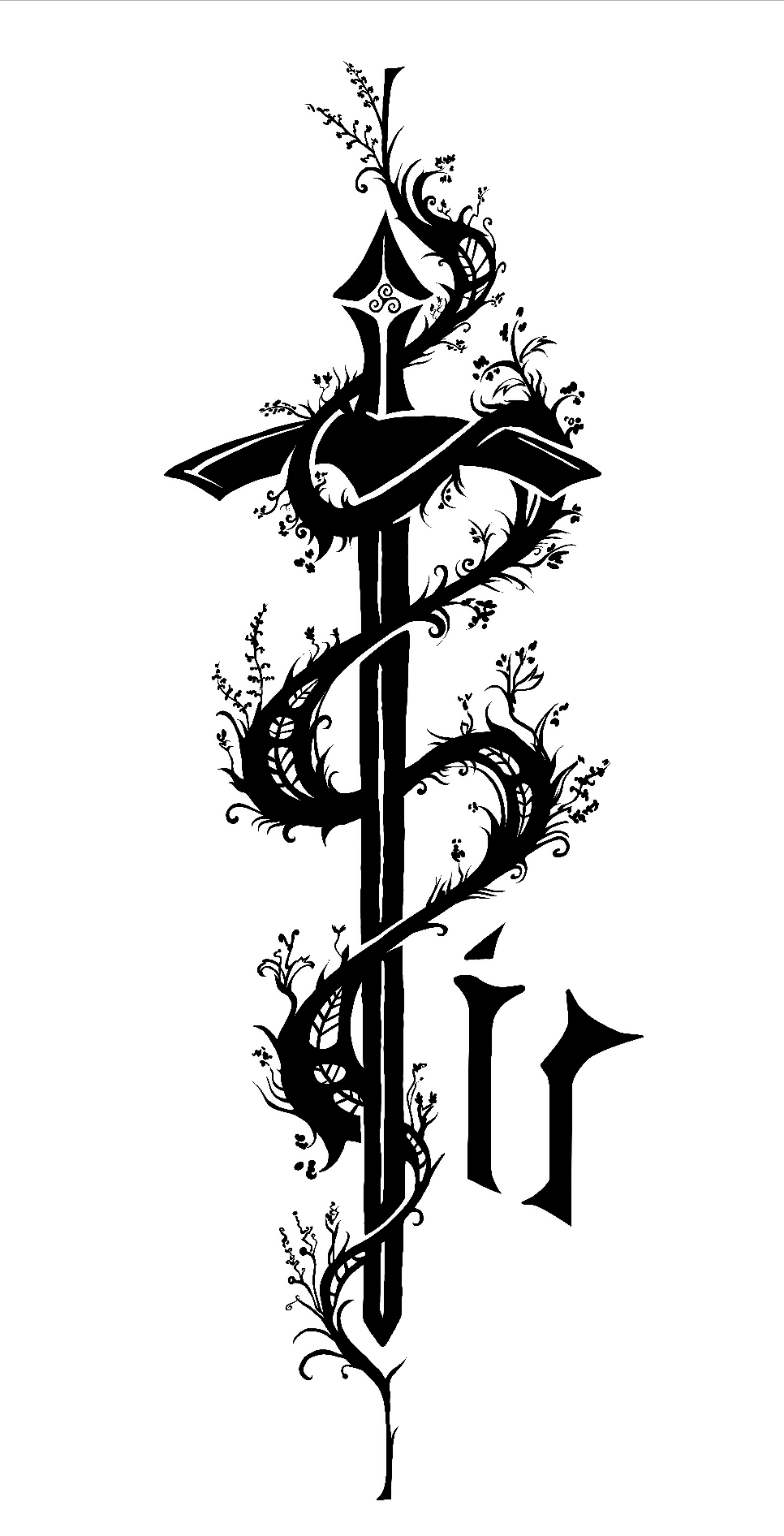
U.Ç.: Son olarak da TİR‘in anlamını sorayım; insanlar neden TİR’i dinlesinler ve bir konserine geldiklerinde ne beklemeliler?
O.B.: TİR, eski Türkçe‘de 'yalın' ve tekil olma' anlamında kullanıldı, bu yüzden bu isme sadık kalmak istedim. Müzikal olarak da geleneksel Dungeon Synth’ten çok daha fazla deneysel örgüye sahip.
90’ların ilk döneminde folk-medieval ezgileri ve Dungeon synth tarzının bayrak taşıyıcısıyım, müziklerim senfonik öğelerlerle yoğun bir komplekse sahip. Bu yüzden şarkılarımın genel olarak akışında çok fazla armonik eksende tutmaya çalışıyorum ve bu da onları biraz uzun kılıyor. Zaman zaman yaşadığımız evreni yalnızlığımızla sorguluyor ve doğaya sığınıyorum; bazen de masalsı bir dünya yaratmaya çalışıyorum. Eğer bu mistik atmosfer yolculuğuna adım atmak için sabırsız olanlar var ise onları o dünyada karşılıyor olacağım.
We continue our interviews conducted on the occasion of Prophecy Fest with Oytun
Bektaş, known in the Dungeon Synth scene through his project TİR, whose sound
spreads from dark dungeons to listeners at festivals and concerts in various countries.
We had an enjoyable conversation in the historic Balve Cave with the musician, who
began his musical journey in Istanbul and now continues his work in Sydney.
Darkest readings.
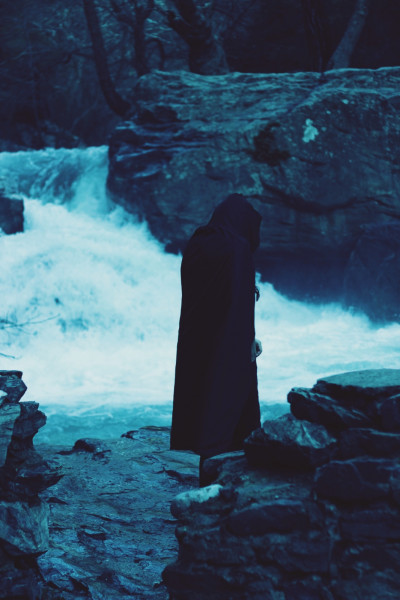
Uğur Çıkrıkçılı: When I listen to Dungeon Synth, I get the feeling that time slows down or enters a different flow. And when darkness and gloom are added, the listener’s experience takes on a very different dimension. How do you use the themes of “time, darkness, and silence” when creating the music of TİR?
Oytun Bektaş: I don’t actually compose based on a specific standard. As the melodies intertwine, the instruments I use also initially spread out into separate, independent channels. Once I am satisfied with the results and the theme I have created, I place those scattered pieces into a single structure. Although it may seem technical, the main goal is to clarify the atmosphere and emotion. Darkness or melancholy takes shape in this process from the smallest detail to the most holistic point.
U.Ç.: In the album Awaiting the Dawn, you touch on ancient texts, poems, and myths. In your view, to what extent do literature and poetry act as a catalyst in your creativity?
O.B.: I am an avid reader. Political philosophy and psychology have always been my primary areas of interest. It may not seem directly related to the theme of TIR, but these are the roots that shaped me and led me to understand nature and species. So it’s possible to find their traces in my music, even if indirectly.
U.Ç.: Album covers and visuals are very typical in Dungeon Synth; although I love them, I sometimes feel that bands fall into repetition and imitation. What would you say about your album covers and designs?
O.B.: Lately, we even see AI-generated covers in scenes outside of Dungeon Synth. But I believe art is the physical reflection of effort and creativity. Countless paintings, illustrations, and photographs from centuries ago up to today have guided us and shaped dark art. That’s why creating covers or logos with AI is not for me. The streets and forests of the world are already filled with frames waiting to be captured. A true artist can create a much more meaningful cover by drawing inspiration at least from there.
U.Ç.: We are currently at Prophecy Fest, and I think this is an important mid-sized festival for Europe. Without overexposing well-known bands and while giving plenty of room to lesser-known ones, it also doesn’t remain strictly in underground-festival territory so in my opinion, it’s a significant event. What kind of experience is it to be on this stage or rather, in this Cave?
O.B.: I have always placed Prophecy Festival in a special place since the very first day it began. It has a personal meaning for me. An important detail here is my friendship with Martin, the owner of the label, which goes back to 2016, and also the close relationships I have with many of the Prophecy-label bands performing here. But above all, the fact that the festival is located in a town far from Dortmund, making it an ideal place to spend proper time with camping and nature, and the aesthetics of the cave have always excited me when I attended as a listener and now I am in a completely different emotional state. I am carrying this atmosphere as an artist this time, and it is an indescribable feeling. For me, everything went very well, both in terms of the performance and what came after. So I would like to thank everyone who was there once again.
U.Ç.: In your discography, themes such as Zoroaster and Persian culture stand out. This history-based narrative is a format we often see in this style. What lies at the core of these references?
O.B.: Persepolis was a dream for me. After a long journey stretching from the streets of Iran to that region, the moment I touched those structures, the idea for an album I had been nurturing inside me took shape. The concept was originally intended for Ruins of Xibalba, because that’s where I created historical albums. But the mystical and haunting atmosphere of Persepolis shook me so deeply that it ultimately came to life in TİR. That demonic feeling standing tall in the middle of the desert, the winds blowing… all of it gradually turned into darkness within the songs.
U.Ç.: This style isn’t something that can be confined to a single geography, but it’s also true that these lands host countless themes bitter, sweet, bloody, sorrowful, mythological that can deeply nourish a musician. While living in Sydney, are you able to tap into these themes, draw inspiration from them, and experience them internally?
O.B.: In the early days, yes when I was in Istanbul. Because it’s impossible to stay indifferent while breathing that atmosphere. But now it’s very different. My musical themes still remain, but I prefer not to imitate emotions that belong to a geography I no longer live in.
U.Ç.: For you, what are the advantages and challenges of being a “one-man project”?
O.B.: Composing and recording songs while carrying out the entire discussion by myself gives me great freedom. That’s why it feels good to keep full control over TİR. My understanding of art has always been based on creating on my own anyway.
U.Ç.: You sometimes release your work in formats like cassette and CD as well. Why are these physical formats still valuable to you in the digital age? We both think they’re worth something, but in what way do they become more meaningful? Even if you do nothing else, you’re at least setting aside a budget to produce something.
O.B.: The latest album was also released on vinyl. I think the impact a physical product leaves on the listener is very valuable. The cover, the lyrics, the visuals… All of them are elements that complete the music. Even though the digital world is moving in the opposite direction, what truly creates the bond is this physical contact. It’s also very important in terms of permanence it doesn’t disappear into nothing like digital does.
U.Ç.: You have close ties and collaborative projects with Empyrium. A concert in Turkey was also being planned but was cancelled. They’re a band that has visited twice before and has a considerable audience in this country. What was the issue?
O.B.: It actually wasn’t cancelled; it was postponed to 2026. But I will not be part of that event as TİR. Without going into detail, I can say that the entire process stemmed from the incompetence of the organizers and the promoter. Officially, the Iran–Israel tension and the political situation in Turkey were cited as security reasons, but in my opinion, it’s complete nonsense.
U.Ç.: Lastly, I'll ask what TİR means, why people should listen to TİR, and what they should expect when they come to a concert.
O.B.: TİR was used in Old Turkish to denote simplicity and singularity. That's why I wanted to remain faithful to this name. Musically, it also has a much more experimental structure than traditional Dungeon Synth. I am a standard-bearer for the folk-medieval melodies of the early 90s and the early period of Dungeon Synth style. My music has a dense complexity with symphonic elements, so I generally try to keep my songs flowing along a very harmonic axis, which makes them a bit long. From time to time, I question the universe we live in with our loneliness and take refuge in nature. Sometimes I also try to create a fairy-tale world. If there are those who are eager to embark on this mystical atmospheric journey, I will welcome them into that world.
